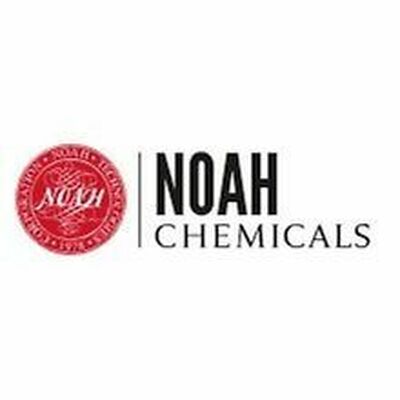Notifications
ALL BUSINESS
COMIDA
DIRECTORIES
ENTERTAINMENT
FINER THINGS
HEALTH
MARKETPLACE
MEMBER's ONLY
MONEY MATTER$
MOTIVATIONAL
NEWS & WEATHER
TECHNOLOGIA
TV NETWORKS
VIDEOS
VOTE USA 2026/2028
INVESTOR RELATIONS
COMING 2026 / 2027
ALL BUSINESS
COMIDA
DIRECTORIES
ENTERTAINMENT
FINER THINGS
HEALTH
MARKETPLACE
MEMBER's ONLY
MONEY MATTER$
MOTIVATIONAL
NEWS & WEATHER
TECHNOLOGIA
TV NETWORKS
VIDEOS
VOTE USA 2026/2028
INVESTOR RELATIONS
COMING 2026 / 2027
About Me
 Noahchemicals Noahchemicals
Noahchemicals Noahchemicals Noah Chemicals is a Texas‑based, ISO 9001:2015‑certified supplier and manufacturer of high‑purity specialty and custom chemicals, serving clients from Fortune 500 companies to government agencies, academic labs, and startups. With a commitment to quality, innovation, and customer satisfaction, Noah Chemicals delivers reliable products and expert support to meet the demanding needs of modern science and technology.
 Noahchemicals Noahchemicals -
Jun 11 -
Technology -
Biosurfactants
-
160 views -
0 Comments -
0 Likes -
0 Reviews
Noahchemicals Noahchemicals -
Jun 11 -
Technology -
Biosurfactants
-
160 views -
0 Comments -
0 Likes -
0 Reviews

Biosurfactants might sound like a complex scientific term, but they’re actually natural compounds with some amazing real-world uses. Produced by microorganisms like bacteria and yeast, these substances help reduce surface tension between liquids and solids, making them incredibly useful in many industries. While most people know about synthetic surfactants (like those in detergents and soaps), biosurfactants are gaining attention for being eco-friendly, biodegradable, and surprisingly versatile.
Here are ten fascinating uses of biosurfactant that you probably didn’t know about—some might even surprise you!
Oil spills are environmental disasters, and traditional cleanup methods often involve harsh chemicals that can harm marine life. Biosurfactant offer a greener solution. Certain bacteria produce biosurfactants that break down oil into smaller droplets, making it easier for natural microbes to digest the oil. This process, called bioremediation, helps clean up spills without leaving toxic residues behind.
Believe it or not, biosurfactants can boost agriculture. Some soil bacteria produce these compounds, which help plants absorb nutrients more efficiently. They also protect crops from harmful pathogens by forming a protective layer around roots. Farmers using biosurfactants in organic farming have reported healthier plants and better yields without relying on synthetic chemicals.
With antibiotic resistance becoming a major health concern, scientists are looking for new ways to fight infections. Some biosurfactant have antimicrobial properties, meaning they can kill or slow down the growth of dangerous bacteria and fungi. Researchers are even studying them as potential treatments for skin infections and wound healing, offering a natural alternative to traditional antibiotics.
Many skincare and haircare products contain harsh surfactants that strip natural oils, leading to dryness and irritation. Biosurfactants, on the other hand, are much milder. They’re used in moisturizers, shampoos, and cleansers to provide gentle cleansing while keeping skin hydrated. Because they’re biodegradable, they’re also a favorite in eco-friendly beauty products.
Ever wondered how certain foods stay creamy or resist spoilage? Biosurfactants play a role here too. In the food industry, they act as emulsifiers, helping mix ingredients that normally wouldn’t blend well (like oil and water). They’re used in products like ice cream, mayonnaise, and baked goods to improve texture. Some biosurfactant also have antimicrobial effects, helping food stay fresh longer.
Drugs often need help reaching the right part of the body, and biosurfactants can assist with that. Because they can form tiny droplets (micelles), they help poorly soluble drugs dissolve better, improving absorption in the body. This makes medications more effective and reduces side effects. Scientists are also exploring biosurfactants in cancer treatments to help deliver drugs directly to tumor cells.
Traditional laundry detergents contain synthetic surfactants that can pollute waterways. Biosurfactants, being biodegradable, offer a cleaner alternative. They work just as well in lifting dirt and stains from clothes but break down naturally in the environment. Some eco-friendly detergents already use them, making laundry day a little greener.
Industrial waste often leaves soil contaminated with toxic heavy metals like lead and mercury. Certain biosurfactant can bind to these metals and wash them away, a process known as soil washing. This method is safer than chemical treatments and helps restore polluted land for farming or construction.
Getting oil out of the ground isn’t easy—sometimes, it gets stuck in rocks. The petroleum industry uses biosurfactants to help extract more oil by reducing surface tension, allowing trapped oil to flow more freely. This method, called microbial enhanced oil recovery (MEOR), is more sustainable than traditional chemical methods.
Chemical pesticides can harm beneficial insects and pollute soil. Biosurfactant are being tested as a safer alternative—they help pesticides stick to plant surfaces better while being less toxic to the environment. Some even repel pests naturally, reducing the need for synthetic chemicals in farming.
Biosurfactants might not be a household name yet, but their potential is huge. From cleaning up pollution to improving medicine and agriculture, these natural compounds offer sustainable solutions to many modern challenges. As industries look for greener alternatives, biosurfactant are likely to become even more important in the future.